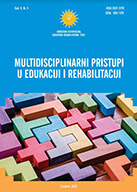ŠKOLSKA ORGANIZACIJA, KULTURA I STATUS ŠKOLE U LOKALNOJ ZAJEDNICI
SCHOOL ORGANIZATION, CULTURE AND STATUS OF THE SCHOOL IN THE LOCAL COMMUNITY
Author(s): Adisa MilićSubject(s): Education, School education, State/Government and Education, Sociology of Education
Published by: Udruženje defektologa, edukatora-rehabilitatora (STOL)
Keywords: teaching process; school organization; school culture; local community; socio-emotional relations;
Summary/Abstract: The school, as an educational institution, has the task of being in accordance with the needs of society and the times, which requires the joint action of pupils, teachers, parents, school management, professional associates, various experts, the local community and other participants that can be brought into contact with school. The goal of the research is to examine pupils’ attitudes about the organization of the teaching process, school organization, culture and status of the school in the local community. The sample of respondents consists of 630 pupils from 34 elementary schools in Sarajevo Canton (city, suburban and district schools), aged from the sixth to the ninth grade, i.e. five pupils from each grade, with different levels of grade success (excellent, very good, good, sufficient and insufficient pupils). Pupils expressed satisfaction with the school organization, the organization of the teaching process, the curriculum, the culture of teacher behavior, and the status of the school in the local community. They are completely satisfied with the teacher-parent and parent-teacher relationships, while they are less satisfied with the culture of pupils behavior and the attitude of classmates towards them. However, the number of those who, according to all claims, expressed partial or complete dissatisfaction is not negligible, which tells us that in the future we should devote more attention to pupil relations, culture and socialization in general. A certain number of pupils expressed their attitude through the answer “I don’t care” and thus confirmed their indifference to everything that happens, which directly or indirectly affects their achievements, motivation and development of competences.The school, as an educational institution, has the task of being in accordance with the needs of society and the times, which requires the joint action of pupils, teachers, parents, school management, professional associates, various experts, the local community and other participants that can be brought into contact with school. The goal of the research is to examine pupils’ attitudes about the organization of the teaching process, school organization, culture and status of the school in the local community. The sample of respondents consists of 630 pupils from 34 elementary schools in Sarajevo Canton (city, suburban and district schools), aged from the sixth to the ninth grade, i.e. five pupils from each grade, with different levels of grade success (excellent, very good, good, sufficient and insufficient pupils). Pupils expressed satisfaction with the school organization, the organization of the teaching process, the curriculum, the culture of teacher behavior, and the status of the school in the local community. They are completely satisfied with the teacher-parent and parent-teacher relationships, while they are less satisfied with the culture of pupils behavior and the attitude of classmates towards them. However, the number of those who, according to all claims, expressed partial or complete dissatisfaction is not negligible, which tells us that in the future we should devote more attention to pupil relations, culture and socialization in general. A certain number of pupils expressed their attitude through the answer “I don’t care” and thus confirmed their indifference to everything that happens, which directly or indirectly affects their achievements, motivation and development of competences.
Journal: Multidisciplinarni Pristupi u Edukaciji i Rehabilitaciji
- Issue Year: 5/2023
- Issue No: 5
- Page Range: 21-35
- Page Count: 15
- Language: Bosnian

